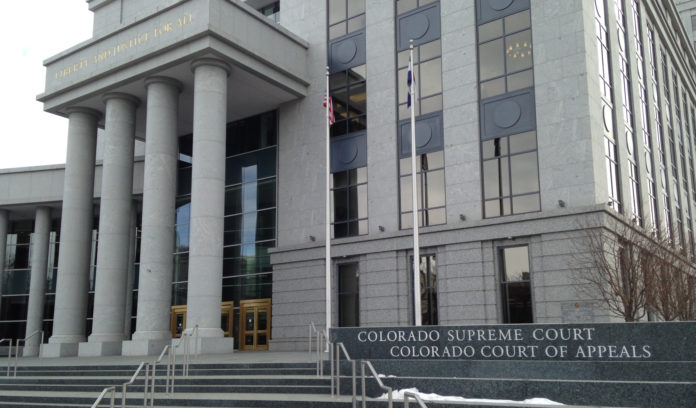

The Colorado Supreme Court will return for a second day of oral arguments this week. On Thursday, the justices will hear arguments about how much white light is too much for a tail lamp. They’ll also consider whether police were justified in physically restraining a DUI suspect during a blood draw.
McBride v. People
Following a stop and search by sheriff’s deputies, Timothy McBride was charged with possession of a controlled substance, firearm possession (special offender), possession of a weapon by a previous offender, a tail lamp violation and failure to signal a turn. McBride moved to suppress, arguing the stop was unjustified, but the motion was denied. He was acquitted of the controlled substance charge and convicted of the traffic offenses along with the weapon possession offense, for which he served time.
A division of the Colorado Court of Appeals reversed his weapons conviction, due to insufficient evidence of knowing possession, as well as his failure-to-signal infraction, since Colorado doesn’t require a driver to signal when navigating roundabouts. The division upheld the tail lamp infraction.
On appeal, the Supreme Court will review the division’s interpretation of Colorado’s tail lamp law, which requires modern vehicles to have two rear-mounted tail lamps that emit “a red light plainly visible from a distance of five hundred feet to the rear.”
The trial court denied McBride’s motion to suppress because it ruled there was reasonable suspicion to stop him for a taillight infraction. McBride was driving a vehicle with taillights that appeared to be broken and were covered in red tape. The officers who pulled him over said they saw both white and red light coming from the tail lamps. Prosecutors argued the tail lamps should only emit red light according to state statute. A division of the Court of Appeals affirmed the interpretation that tail lamps may only emit red light.
McBride says that interpretation is wrong. He contends that, under the plain language of the statute, it is acceptable for tail lamps to emit some white light if they also emit a red light plainly visible 500 feet to the rear of the car. By arguing otherwise, prosecutors are adding words to the statute, according to McBride.
The question before the high court is whether any white light is too much under the tail lamp statute, regardless of whether the tail lamps emit enough red light to comply with the law’s requirements.
People v. Raider
In this DUI case, the state challenges the reversal of Charles Raider’s convictions by the Court of Appeals. Police found Raider in an illegally parked SUV with the keys in the ignition and the engine running. Raider’s eyes were bloodshot and his speech was slurred, according to the state, and he smelled of alcohol and seemed intoxicated.
Raider refused a roadside sobriety test, and an officer informed him of Colorado’s expressed consent statute, which requires anyone driving a motor vehicle on streets or highways in the state to take a blood or breath test if a law enforcement officer finds probable cause for driving under the influence.
The officers discovered Raider had five previous DUI convictions and placed him under arrest, took him to a hospital and obtained a search warrant to draw his blood. The warrant authorized the use of reasonable force. According to the state, Raider became “combative,” resisted blood collection and had to be restrained during the test, which eventually revealed a blood alcohol level of 0.188.
Raider’s attorney moved to suppress the blood test results, arguing the officers’ use of force violated a provision of the expressed consent statute, which only allows law enforcement to restrain suspects under a handful of conditions — none of which were present in Raider’s case. The trial court denied the motion, finding that the provision in the statute only applies during a warrantless search, and the officers who restrained Raider had a warrant. Raider was convicted of felony DUI and obstructing a police officer.
However, a division of the Court of Appeals reversed his convictions, concluding that even with a warrant, the officers’ use of physical restraint during blood collection was prohibited. The division suppressed the results of Raider’s blood test and remanded the case for a new trial.
On appeal, the state argues the trial court’s interpretation was correct and the expressed consent law’s prohibition on physical restraint only applies to warrantless searches. According to the state, the Court of Appeals’ interpretation conflicts with other statutes on search warrants.
Raider contends that the expressed consent statute makes it clear that unless one of the enumerated exceptions applies, physical restraint is prohibited when obtaining biological specimens in DUI investigations. If the legislature had intended for law enforcement to be able to get warrants for forced blood draws, it would have said so, Raider says in his answer brief to the Supreme Court.
The Supreme Court will consider whether the Court of Appeals erred by concluding the expressed consent statute provides DUI suspects protection from the use of physical restraint when officers have obtained a search warrant for a blood draw.

